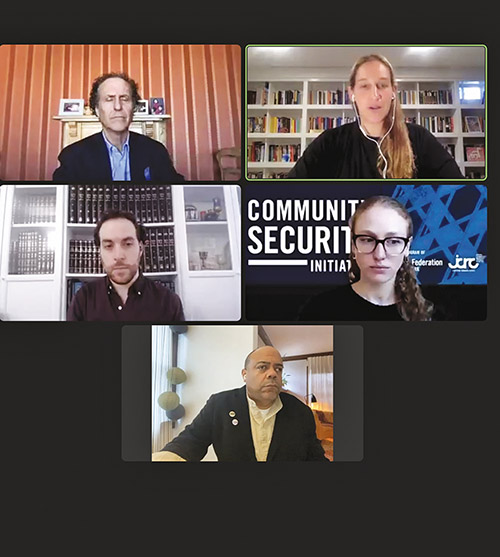
Antisemitism is growing, becoming more mainstream and is a threat to more than just the Jewish community. Those statements were among the takeaways from “Antisemitism Rising: What You Need to Know,” a one-hour virtual program on Monday afternoon, sponsored by the UJA-Federation of New York.
“Antisemitism is emerging as an equal opportunity ideology, crossing through every line of race, political party” and more, said Eric Ward, executive director of Western States Center, adding that the way it’s “playing out in the United States is an attack on democracy. As a non-Jew [I believe] it imperils all of us.”
In most forms of racism, he said, people are “placed in inferior positions. But the racism of antisemitism places Jews not as inferior, but as something outside of the human race.”
Left unchecked, antisemitism carries a real threat across communities, said Ward. He went on to say that the real failure is that in our civil society institutions haven’t intervened to stop antisemitism “despite the real physical costs that are taking place every day across America.”
The UJA-Federation discussion came just days after the FBI issued a security warning to Jewish institutions in New Jersey, and amid ongoing antisemitic statements by rapper Kayne West and by New York Nets basketball player Kyrie Irving’s social media posting of an antisemitic film.
Daniel Glass, a member of the UJA board of directors and the CEO and founder of Glassnote Music, said the situation with West is particularly upsetting given their prior interactions. “Over 20 years ago, Kayne helped me and our organization [LIFEbeat, an HIV/AIDS-related nonprofit] very much. He was one of the first Black people to come forward and participate in our fundraiser.
“As a member of the music community I’m embarrassed, ashamed at my peers for their silence and for not condemning this immediately,” Glass said, adding that he isn’t advocating censorship of West’s music but the silence of the industry as a whole is “unacceptable.”
According to Rebecca Federman, a threat intelligence analyst with the Community Security Initiative, a program of the UJA-Federation and JCRC-NY, people are often asking just how concerned they ought to be about antisemitism in the United States.
“I don’t think we are at the point where we all need to fill out our Nefesh B’Nefesh applications yet,” she said, “but antisemitism is becoming more mainstream and that’s really troubling.”
Federman explained that the Community Security Initiative includes regional security managers, all of whom are former law enforcement officers, who cover the five boroughs of New York, Long Island, Westchester County, and most recently Rockland County as well. Additionally, CSI has cyber-security “gurus” and analysts.
“We see ourselves as a bridge connecting Jewish institutions to law enforcement,” Federman said. She explained that when an incident or threat happens, members of the security initiative will instantly jump online to see what they can find in the cybersphere. Sometimes they can produce results faster than law enforcement can, though they always share what they learn immediately.
According to Federman, much of the online hate can be found on the dark web, which she calls the “underbelly of the internet … where so much hate percolates.”
But simply looking at posts on the dark web isn’t enough, Federman explained, noting that “it’s important to understand the common parlance and extremist’s code of language, as they don’t say ‘Jews’ or ‘blacks.’ They have terminology they use to refer to weapons” without saying the words “guns,” “weapons,” etc.
The dark web is also where hate groups “recruit and organize. It’s where they form new groups and that’s also important, to understand how big they are, what’s their ideology, what they are planning.” Federman added that the lines between what is found on the deep web and mainstream social media has been “getting blurry,” leading to an uptick on antisemitism online.
The discussion was moderated by Rachel Fish, the co-founder of Boundless, and also included Yair Rosenberg, a contributor to The Atlantic.













